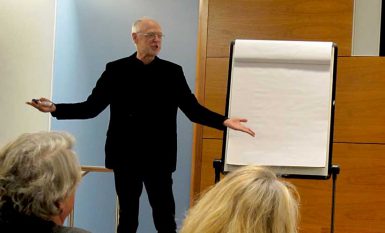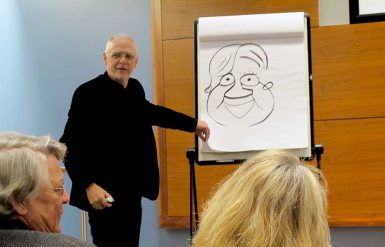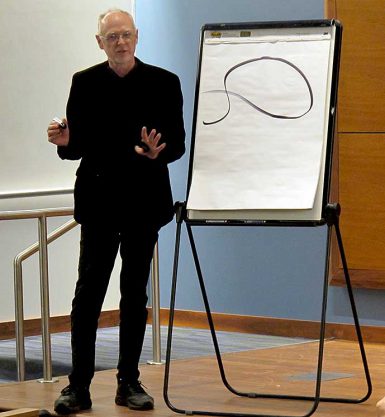Joel Pett: Political cartoonists aim to make readers ‘uncomfortable’

Jan. 7, 2015, Islamic terrorists killed 11 people and wounded 11 more at the office of French satirical magazine Charlie Hebdo in retaliation for the magazine’s publication of cartoons that mocked the Muslim prophet Muhammad.
According to Pulitzer Prize-winning political cartoonist Joel Pett, violence is not an uncommon reaction to good cartoons.
“Political cartoonists for some reason have this peculiar ability to really piss people off,” he said during a visit to campus Saturday.
Pett, who has been the editorial cartoonist at the Lexington Herald-Leader for nearly three decades, spoke about politics, his work and the dangers of being a political cartoonist in countries with strict sedition laws as a guest of the In Light Film Festival, which aims to bring human rights and ethnographic documentary films to the area.
During his talk at the Government and International Studies Building, Pett said the freedom of speech laws in the United States make it one of the safest places in the world for editorial cartoonists.
“People oftentimes say that I’m unpatriotic because I criticize the government a lot, but I’m really very patriotic because very few countries in the world pay you anything to draw your commander-in-chief as semen,” he said.

Pett showed some of his work to demonstrate his point. His cartoons cover issues including abortion rights, gun laws, corporate media, global warming and the Syrian refugee crisis. He’s depicted politicians and people of power in creative ways, ranging from drawing Senate majority leader Mitch McConnell as a turtle to President Obama as a puzzle piece.
On a large canvas perched on an easel, Pett went to work creating caricatures of political figures, starting with Richard Nixon and finishing with the upcoming presidential election’s candidates. He even gave the audience tips for accurately illustrating these figures. For example, the swoop of Donald Trump’s hair is his most recognizable feature, and the key to drawing Hillary Clinton is her big eyes, he said.
While Pett’s disposition as he drafted these cartoons was light-hearted, he said that not all editorial cartoons are meant to make people laugh.
“Political cartoons are not intended to be funny. Some of them are funny. Often, you think they’re funny if you agree with them,” said Pett. “They’re supposed to make you kind of uncomfortable.”

As demonstrated in the Charlie Hebdo bombing, cartoonists sometimes make people in power so uncomfortable they are punished, legally and lethally. Pett is a board member of Cartoonist Rights Network International, an organization that aims to protect cartoonists who are subject to harm for their controversial work.
Pett recounted examples, such as a man who was beaten nearly to death for drawing political figures as animals in Malaysia and an Indian woman who had to go into hiding after making a statement about a guru who had been raping young women. Pett said that inherent tendency cartoonists have for questioning authority is the reason they need protection, but also the reason they are in the profession.
“Who goes into journalism that is happy with the status quo?” said Pett. “Journalism is full of the type of people who don’t like the type of stuff that’s going on and want to find the truth.”
Later that evening at IU Cinema, Pett introduced the documentary Je Suis Charlie and moderated a discussion. The film chronicles the events leading up to the attack on the French magazine.
The three-day festival also featured several other documentary screenings with talks, a workshop with the creators of The Russian Woodpecker documentary and several other film screenings.
The festival was co-sponsored by The Media School’s Center for Documentary Research and Practice.

